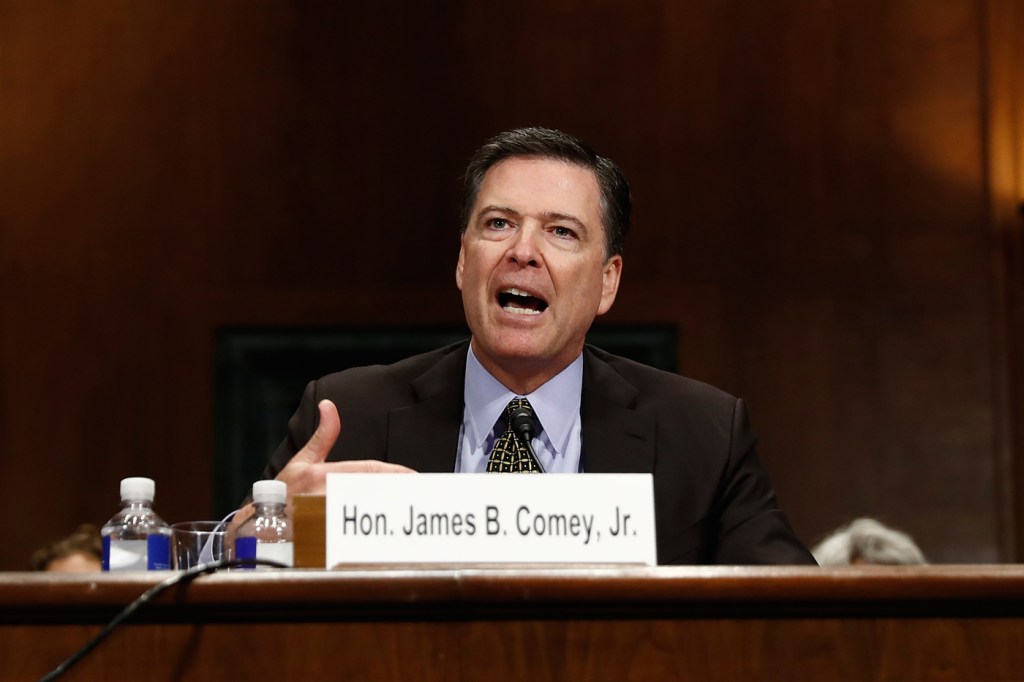The Comey hearing: What to watch for and what to make of the hype

On Thursday, former FBI Director James Comey—who was fired last month by President Donald J. Trump—will testify before the Senate Intelligence Committee regarding his interactions with the president about the FBI’s investigation into possible links between Trump’s team and Russian interference in the 2016 election. Comey’s opening statement, which was made public Wednesday afternoon, details five such interactions.
With political pundits starting to weigh in days before the hearing began, and dozens of news outlets set to carry live coverage of the testimony, we called on Northeastern faculty experts in political science, law, and journalism to help break down what we should be watching for.
William Crotty, professor emeritus of political science, and John Portz, political science professor and interim chair of the Department of Political Science, say to pay close attention to how specific Comey gets in his answers and note-taking. Martha F. Davis, law professor and associate dean for experiential education, notes that Comey has been called to testify, but not been subpoenaed—something that could give him the leeway not to answer certain questions if he so chooses. Finally, journalism professor Alan Schroeder highlights the unusualness of this week’s media blitz and cautions that expectations may be too high for what’s to come.
What should we watch for?
Crotty: What I’m looking for is to see how forthcoming this testimony is; how precise James Comey is in the substance of what he says. What I’m cautious about is that he’ll talk in generalities like he’s done before—he’ll give indirect hints about what’s happened. He could also say that given ongoing investigations, he’s not going to say anything at all of any consequence, but that he wanted to appear in such a way to show that he had nothing to hide.
The basic question here is: Is he going to address the issues in any depth?
The other facet of this is that this is a public forum, which is very different from an FBI investigation. And in the background of that is the question that’s lingered over this whole issue: How intensive is the questioning going to be from a Republican-dominated committee?
Portz: In his opening statement, Comey describes his process of note-taking after conversations with President Trump. I would watch for questions that reveal how detailed the actual notes are, and whether those notes be available to the committee. In the statement, he refers to nine one-to-one communications with President (or President-elect) Trump, but does not describe all of them in the statement, so also watch for questions regarding the content of the other communications. For example, when did they happen? In the statement, Comey’s characterization of the conversation with President Trump with respect to Flynn is rather vague. I’ll be watching for Senate Intelligence Committee members to push Comey on this issue more, and ask: “What do you think was the intent of the President?” or “On what basis do you infer that intent?” Although it’s somewhat problematic to ask Comey to speculate on the intent of the President, one might still ask: “Why do you think the President dismissed you?”
Also, it will be interesting to see how senators on both sides of the aisle try to legitimize or delegitimize his testimony. Comey has friends and foes among both Democrats and Republicans.
What, exactly, is a congressional hearing?
Davis: As I understand it, James Comey has been invited to testify but has not been subpoenaed by the Senate Intelligence Committee. He may decline to answer some questions—in fact, he has worked out a deal with Special Counsel Robert Mueller III (who’s investigating the Russian matter) about what he (Comey) can and cannot say so as to avoid jeopardizing the investigation.
The Senate could try to force Comey to reveal some of that information. To do that, it would need to issue a subpoena and then, if Comey did not respond or answer every question, it could try to hold him in contempt of Congress in an effort to compel his testimony.
I think it’s very, very unlikely that they would do that, since it would interfere with executive functions (i.e., the Justice Department investigation) and would provoke a constitutional confrontation between the president and the Congress. We may be heading toward that anyway, but it’s not going to come up with the Comey testimony.
The proceeding will not be like a trial, but will be very boring, with one senator after another asking rather partisan questions. At the end, though, we’ll know more than we did on Wednesday.
Dozens of news outlets are carrying this hearing live. What’s the significance of that?
Schroeder: I’ve been struck by all the hype, frankly. This buildup, the kind of pregame analysis, the countdown clocks—all of those tropes that surround big political events, we’re seeing now. Additionally, the fact that broadcast networks are giving over their programming to a piece of government business is highly unusual. We never see this. Usually they would rely on viewers heading to cable networks that would traditionally carry something like this.
An article by The Washington Post on Wednesday described this as a “political Super Bowl;” it’s being positioned as a competition between Comey and Trump. Trump himself is feeding into that, with the speculation that he may live-tweet the hearing.
Of course, the danger here is that expectations are too high for what’s actually going to happen. As we’ve seen him, James Comey is a button-down law enforcement guy who has testified before Congress many times before. This isn’t Jack Nicholson in A Few Good Men; we’re not going to have a conclusion to this one in one afternoon. The media may have positioned this in a way that will not live up to the hype, but of course, you never know. That’s the whole thing with live TV: it’s unscripted.
Where can we watch?
The hearing starts at 10 a.m. at the Hart Senate Office Building on Capitol Hill. It will be covered by a number of news outlets, including:
TV:
- ABC [LIVE]
- Bloomberg [LIVE]
- C-SPAN [LIVE]
- CBS [LIVE]
- CNN [LIVE]
- Fox News [LIVE]
- MSNBC [LIVE]
- NBC [LIVE]
Online:
- ABC News website [LIVE]
- BBC Parliament website [LIVE]
- C-SPAN website [LIVE]
- CBS News website [LIVE]
- CNBC website [LIVE]
- NBC News website [LIVE]
- The New York Times website [LIVE]
- NPR website [LIVE]
- PBS NewsHour Livestream on YouTube [LIVE]
- Reuters TV (website and apps) [LIVE]
- USA Today Livestream [LIVE]
- The Wall Street Journal website [LIVE]
- The Washington Post website [LIVE]
Radio:
- NPR national
- WBUR
- WGBH
Social Media:
- The Hill Facebook page
- The Independent Facebook page
- Los Angeles Times Facebook page





